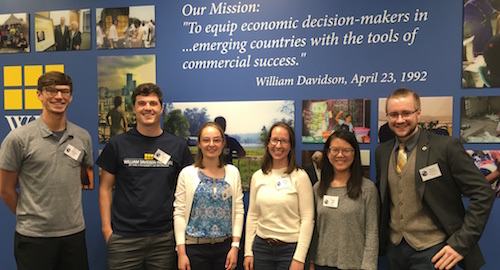
WDI’s 2018 summer interns before they set off on their voyages.
Over the years, WDI’s summer interns have faced unique challenges as they have conducted their work across the globe for the Institute and its partners. Impassable roads, extreme weather, the occasional wild animal. An active volcano can now be added to the list.
WDI intern Nadia Putri spent her summer in Bali, Indonesia working with East Bali Cashews on quality improvement projects, measuring the company’s impact on women and developing a U.S. market entry strategy. She also got an up close look at emergency preparedness.
“It was really beautiful, but a bit scary at the same time for someone who has never seen anything like it before,” she wrote of watching the sparks of lava and plume of smoke rise from the crater near where she was working. The cashew factory was outside the evacuation zone but management kept a daily eye on the volcano in case conditions changed. Earthquakes in the region have claimed nearly 400 lives during August.
Putri was one of six WDI interns working internationally this summer. Some, like Putri, have returned to the University of Michigan campus; others are finishing up their work and will be back in Ann Arbor soon. While overseas, the interns contributed to a blog to chronicle not only their work but also the experience of living in a foreign land. WDI has highlighted some of the work below and the full blog chronicling interns’ experiences is available here.
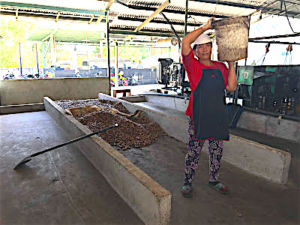
East Bali Cashews where Putri worked sources sustainably grown cashews from nearby smallholder farmers and processes them in a factory located in a remote village in one of Bali’s poorest regions. Since its launch in 2012, the company has integrated various social missions in and around its cashew processing operations, including community improvement and women’s empowerment.
Putri, a Ross School of Business MBA candidate, said factory workers were very supportive of her work and willing to explain how the company has impacted them. One employee recalled being hired after graduating from high school and is now in charge of 50 workers.
“At the factory, everyone is very welcoming and open to share their stories,” Putri wrote in her blog. “It’s especially humbling to see such high curiosity and willingness to learn from the factory employees. This serves as my daily reminder that (the) situation you grew up or lived in does not define who you could be.”
In Kenya, Andrea Arathoon, a School of Public Health graduate student, was tasked with helping a local maternity hospital reduce costs and increase patient volumes to achieve sustainability while also maintaining quality. One intervention Arathoon worked on for Jacaranda Maternity is a new outpatient care checklist for prenatal visits.
 The checklist is designed to improve patient processing within the outpatient clinic. This improved flow will reduce wait times and result in more efficient consultations, thus increasing patient volume and reducing costs, Arathoon wrote. She ensured the checklist followed the World Health Organization and Kenya Ministry of Health guidelines. The hospital’s doctors, nurses and administrative staff were consulted, and everyone was trained on how to properly use the new tool.
The checklist is designed to improve patient processing within the outpatient clinic. This improved flow will reduce wait times and result in more efficient consultations, thus increasing patient volume and reducing costs, Arathoon wrote. She ensured the checklist followed the World Health Organization and Kenya Ministry of Health guidelines. The hospital’s doctors, nurses and administrative staff were consulted, and everyone was trained on how to properly use the new tool.
“I am very excited about my summer project and the impact that it can have in improving maternity care for women and children in the country,” Arathoon wrote on the blog.
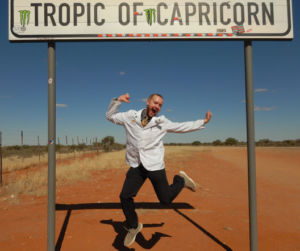
Across Africa on the Atlantic coast, Mason Benjamin is working in Namibia on pharmacy workforce development and hospital pharmacy practice. Benjamin, a College of Pharmacy graduate student, joined a collaborative project between WDI and the International Pharmaceutical Federation Hospital Pharmacy Section. The goal of the project, which includes the University of Namibia School of Pharmacy, is to increase the capacity of hospital pharmacists in Namibia through in-country diagnostics and technical assistance.
Benjamin has been traveling all across the country to visit hospital pharmacies in different regions to develop a landscape analysis of hospital pharmacy practices at both private and public hospitals. Before his site visits began, Benjamin attended the Medication Utilization Review In Africa (MURIA) conference, where he learned about pharmacy practice not only in Namibia but also across Africa.
“I was aware of how different the healthcare system in the United States might be from anywhere else in the world, but always felt that researching other systems online had its limits,” Benjamin wrote in the blog. “I much prefer to learn right from the source and in person, so I was grateful for the opportunity to ask questions to practicing pharmacists from over a dozen different African countries about how things worked in their setting.”
In India, the population of cities is expected to increase by 250 million people in the next 20 years, making employment a crucial need for the new transplants. Ross School of Business MBA student Chris Owen is working with MADE (Michigan Academy for the Development of Entrepreneurs) and its Madurai-based partner Poornatha, which is designing an affordable, world-class coaching curriculum for entrepreneurs in emerging economies. MADE was founded by WDI and U-M’s Zell Lurie Institute.
Owen is identifying best practices of existing coaching programs in India and other emerging economies, conducting a needs assessment of entrepreneurs in Madurai and developing a framework and training curriculum for how coaches will be identified, on-boarded and trained.
“By investing in strong local economies, India can address its dual-challenges of rapid urbanization and rising unemployment,” Owen wrote on the intern blog. “Indeed, for this reason, entrepreneurship in India – and the work of Poornatha – is becoming increasingly important.”
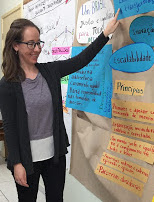 In Brazil, Rebecca Grossman-Kahn – a student at Ross and the U-M Medical School – is developing a tool to assess the social impact of the gender equality programs of Plan International’s Brazil office. Plan International has a long history of advocating for children’s rights but recently decided to focus its work in Brazil on promoting girls’ rights and equality. Gender roles in Brazil tend to be rigid and many girls stop studying in middle or high school to help with housework at home, Grossman-Kahn wrote on the blog. She attended a staff retreat to strategize on how to combat resistance from community members and organizations regarding Plan’s new focus on gender.
In Brazil, Rebecca Grossman-Kahn – a student at Ross and the U-M Medical School – is developing a tool to assess the social impact of the gender equality programs of Plan International’s Brazil office. Plan International has a long history of advocating for children’s rights but recently decided to focus its work in Brazil on promoting girls’ rights and equality. Gender roles in Brazil tend to be rigid and many girls stop studying in middle or high school to help with housework at home, Grossman-Kahn wrote on the blog. She attended a staff retreat to strategize on how to combat resistance from community members and organizations regarding Plan’s new focus on gender.
While at the retreat, a new World Bank report was released that showed girls who complete secondary education can expect to earn twice as much as those with no education.
“Studies like this can help get community leaders on board with Plan’s mission,” Grossman-Kahn wrote.
In Nepal, nearly two out of three working people are farmers. But the country’s rugged topography and lack of infrastructure makes it difficult to farm year-round despite a lengthy monsoon season. Additionally, in rural Nepal, only 5 percent of the population has reliable access to electricity. But the country has more than 300 days of sunshine, making it a perfect candidate for solar-powered agricultural services.
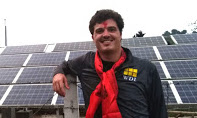 Matthew Carney, a dual degree student at Ross and the U-M School for Environment and Sustainability, spent the summer with the solar startup Ecoprise to help bring solar-powered agricultural services to subsistence farmers in the Terai region of Nepal that borders India. AgroHub, a pay-as-you-go service-based business model recently started by Ecoprise, provides access to solar-powered infrastructure for remote, underserved farming communities. These hubs provide farmers with access to equipment for irrigation, clean drinking water, food-processing and refrigerated post-harvest storage as a service.
Matthew Carney, a dual degree student at Ross and the U-M School for Environment and Sustainability, spent the summer with the solar startup Ecoprise to help bring solar-powered agricultural services to subsistence farmers in the Terai region of Nepal that borders India. AgroHub, a pay-as-you-go service-based business model recently started by Ecoprise, provides access to solar-powered infrastructure for remote, underserved farming communities. These hubs provide farmers with access to equipment for irrigation, clean drinking water, food-processing and refrigerated post-harvest storage as a service.
AgroHub has proved very successful for those farmers who have used it, allowing them to irrigate more land during the winter and monsoon seasons and reducing the use of diesel-powered water pumps that saves money. Carney’s task is to develop a plan to bring the service to farmers in western Nepal.
“Solar-powered agriculture presents an opportunity to raise the living standards of millions of rural Nepali farmers in a sustainable fashion,” he wrote. “It would be a shame to waste it.”
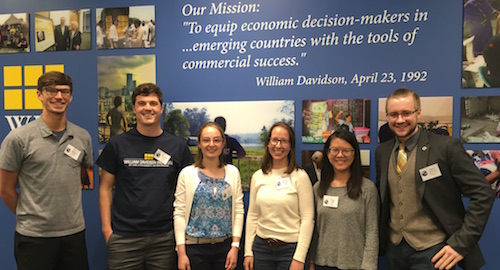
Six U-M graduate students are participating in the 2018 WDI Global Impact Internship program.
When Rebecca Grossman-Kahn was in high school, she was a volunteer with Amigos de las Américas, a youth leadership and cultural exchange program that partners with Plan International, a global development and humanitarian organization. While an undergrad at Stanford University, she worked in Honduras and Nicaragua for the organization.
“I just loved it,” she said. “I loved living in a different place, I loved speaking Spanish.”
So when the Ross School of Business MBA candidate and University of Michigan Medical School student was looking to create her own summer internship, she reached out to several organizations. The first to respond was Plan International, which works to empower children – especially girls.
“They were interested in revamping their evaluation program and I knew WDI worked in performance measurement,” Grossman-Kahn said.
She pitched the partnership to WDI as a student-initiated internship and it was approved. In mid-June, she will head to Brazil to develop a survey tool Plan International will use to assess the impact of their programs. In addition to student-initiated internships, WDI also develops student summer opportunities along with its partners.
Grossman-Kahn is one of six U-M graduate students participating in the 2018 WDI Global Impact Internship program. The students represent the Ross School of Business, the School of Public Health, the College of Pharmacy, the School for Environment and Sustainability (SEAS) and the Medical School. They will work in Brazil, India, Indonesia, Kenya, Namibia and Nepal, and support the work of WDI initiatives in Education and its Entrepreneurship Development Center, Energy, Healthcare, Performance Measurement and Scaling Impact. All of the interns have met with their respective WDI initiative leaders and will continue to keep in touch once in the field.
Colm Fay, who leads WDI’s Energy Initiative, said he is interested in understanding more about access to energy for productive use because of the impact it can have in low- and middle-income countries. Fay will be working with graduate student Matthew Carney, who will be interning at Ecoprise, which designs, builds and installs clean energy products in Nepal for energy-poor communities.
“Matt’s work with Ecoprise will provide important learnings about how an innovative business model to provide energy for agricultural loads can impact rural livelihoods, and how the well-being of these communities can be enhanced through greater access to energy,” Fay said.
Fay also directs WDI’s Scaling Impact initiative and is working on a project in Kenya with intern Andrea Arathoon. He said Scaling Impact wants to develop tools and frameworks that help enterprises achieve sustainability at scale.
“Andrea’s experience with Jacaranda, an organization that is seeking both to scale its operations as well as replicate its approach through partners, will further our understanding of the strategies and resources that are necessary to design business models for scale,” Fay said. “Her work will also provide great insights on how enterprises measure performance in terms of both sustainability and impact, and how best to frame this for investors.”
For Grossman-Kahn, her summer in Brazil will not be her first trip to the country. She lived there while participating in a study abroad program as an undergrad and learned Portuguese. She is looking forward to going back and collaborating with a familiar partner.
Grossman-Kahn said she will split her time between doing high-level strategy work in an office in Sao Paulo and observing Plan International’s programs in rural towns.
“I’m really excited about working with Plan International again,” she said. “They are really mission driven. Everyone in the organization is passionate about the work they’re doing.”
Here are the all WDI interns and their projects:
Andrea Arathoon
School of Public Health
Jacaranda Health
Nairobi, Kenya
WDI Partner: Scaling Impact initiative
Jacaranda Health operates a maternity hospital where it sees more than 2,000 clients a month and wants to create East Africa’s first truly sustainable and scalable maternal health service delivery organization. It is partnering with 15 government hospitals to refine a model for improving quality of maternal healthcare in the public sector.
Andrea will develop the latest version of Jacaranda’s business model and debt/equity financing structure for its next round of investment. She also will assess market and business model opportunities for expansion, improve profitability in the hospital by evaluating new service lines, marketing and customer insights.
Mason Benjamin
School of Pharmacy
WDI & International Pharmaceutical Federation (FIP) Hospital Pharmacy Section (HPS)
Namibia
WDI Partner: Healthcare initiative
FIP is a global federation representing 3 million pharmacists and pharmaceutical scientists worldwide. The Hospital Pharmacy Section’s objectives are to further hospital pharmacy in all its aspects, including the needs of developing countries. FIP, in partnership with WDI, is establishing a collaboration with the University of Namibia School of Pharmacy to increase the capacity of hospital pharmacists in two pilot countries, Namibia and Pakistan, through in-country diagnostics and technical assistance. The summer intern will provide preliminary research on Namibia, which will then inform next steps and content design for this collaboration in pharmacy workforce development.
Mason will develop a landscape analysis of hospital pharmacy practices in Namibia, both at private and public hospitals, in support of a larger pharmacy workforce development goal.
Nadia Putri
Ross School of Business
East Bali Cashews
Bali, Indonesia
WDI Partner: Entrepreneurship Development Center (Education Initiative)
Founded in 2012, East Bali Cashews (EBC) sources sustainably grown cashews from nearby smallholder farmers and processes them in a factory located in a remote village in one of Bali’s poorest regions. Since its launch, the company has integrated various social missions in and around their cashew processing operations, including community improvement and women’s empowerment.
For her internship, Nadia will design a U.S. market entry strategy and actionable roadmap, develop sustainable quality and efficiency improvements and create a food production “best practices” guide. Additionally, in partnership with WDI’s Entrepreneurship Development Center, Nadia will develop a strategy to support EBC’s mission for women empowerment and develop a mini case study how they would achieve it.
Chris Owen
Ross School of Business and School for Environment and Sustainability
Michigan Academy for the Development of Entrepreneurs (MADE)
India
WDI Partner: WDI President Paul Clyde
The Michigan Academy for the Development of Entrepreneurs (MADE) is a U.S.-based nonprofit organization whose aim is to develop entrepreneurs in emerging economies. MADE was founded by the William Davidson and Zell-Lurie Institutes at the University of Michigan and Aparajitha Foundation in Madurai, India. MADE provides Entrepreneurship Development Organizations (EDOs) in emerging economies a repeatable, scalable, transferable and profitable service platform to develop entrepreneurs in their home countries.
For his project, Chris will Identify best practices of existing coaching programs in India and other emerging economies, conduct a needs assessment of entrepreneurs in Madurai and develop a framework and training curriculum for how coaches will be identified, on-boarded and trained. Chris’ work continues a succession of Ross School student teams who have worked with MADE since its launch in late 2017.
Rebecca Grossman-Kahn
Ross School of Business and University of Michigan Medical School
Plan International
Brazil
WDI Partner: Performance Measurement initiative
Plan International is a not-for-profit, non-governmental organization founded in 1937. It is a development and humanitarian organization that advances children’s rights and equality for girls through various programs.
For her internship, Rebecca will develop a tool to assess the social impact of Plan Brazil’s gender equality programs; develop a framework for evaluating impact of violence prevention and girls’ empowerment programs that can be adapted to other partner organizations and in other settings. In addition, Rebecca will also analyze Plan International’s program cost structure and provide recommendations for standardizing and cost savings.
Matthew Carney
Ross School of Business and School for Environment and Sustainability
Ecoprise
Nepal
WDI Partner: Energy initiative
Founded six years ago, Ecoprise designs, builds and installs clean energy products in Nepal for the underserved, energy-poor communities in order to create positive economic, environmental and social impact. Ecoprise recently started AgroHub, a pay-as-you-go service-based business model that aims to provide access to solar-powered infrastructure for remote underserved farming communities. These hubs provide farmers with access to equipment for irrigation, clean drinking water, food-processing and refrigerated post-harvest storage as a service, with ownership of equipment remaining with AgroHub or Ecoprise.
Matthew will develop a theory of change report and a business plan for Ecoprise’s AgroHub model in western Nepal.
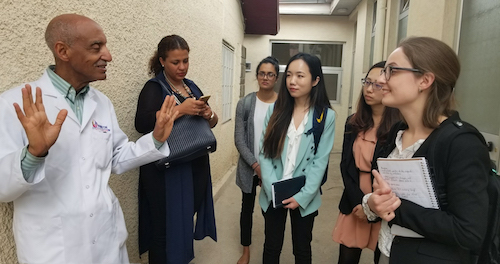
BA685 students working with Ethio-American Doctors Group (EADG) in Ethiopia interview a physician.
Qin Dong said the healthcare delivery course she took this semester taught her a lot about practices inside and outside the United States, including how healthcare organizations harnessed different business models to scale up and meet patient needs.But the biggest lesson for Dong from the weeks of classroom learning and in-country work came down to empathizing with the customer.
“My takeaway is probably true for every consulting-like project: don’t make assumptions about what is best for the customers, listen to them, and cater to their needs,” she said. “Any recommendations that don’t fit with a customer’s situation won’t be helpful at all regardless how successful it was in the past.”
Dong’s Rwanda team was one of five that spread out around the globe for the BA685: Healthcare Delivery in Emerging Markets course taught by WDI President Paul Clyde. Other teams worked in Ethiopia, India, Peru and Sri Lanka. All five teams will present recaps of their projects at 5 p.m. on April 16 in Room R1240 at the University of Michigan’s Ross School of Business. It is free and open to the public, and students in business, public health and other disciplines are encouraged to attend. A reception will follow.
Comprised mostly of MBA2 students, the course is designed to enhance participants’ international leadership capabilities, increase awareness of diverse business issues within the current global landscape, provide on-the-ground experience in a foreign country, and contribute to the success of partner health clinics and hospitals.
The course, organized and primarily funded by WDI with some financial support from Ross, responds to the increasing need for managers to have an international business perspective to augment their business and management knowledge. During the first part of the term, students learned about healthcare in emerging markets through lectures, guest speakers and case discussions. Students were then divided into five teams and prepared for visits to their selected country, traveling to those destinations in late February and early March.
The travel-study course empowers students to integrate what they learned in the classroom with hands-on experience. But unlike the Ross School Multidisciplinary Action Projects (MAP), Dong said the healthcare delivery course “exposes us to an environment where sponsors and other stakeholders have little business knowledge and no clear expectations about the projects.
“This can increase the difficulty and scope of the projects. However, it mimics real-life situations for the most part,” she said.
Clyde said the course is “business education at its best” – a collaborative learning environment with faculty and students learning from each other in an action-based learning setting.
“This course allows me to have detailed conversations with the students about some of the newer approaches to healthcare in low- and middle-income countries, and then gives them the chance to experience some of those markets in person and develop some of these new methods in concert with the institution,” Clyde said. “No matter how much I discuss it in class, there is no way to convey all of the challenges and opportunities in these markets without having the students actually visit the locations.”
Jennie Proto Gondhi, who was part of the Sri Lanka team, said she was attracted to the class to learn about the business perspective of healthcare and how business models can help solve public health problems. In pursuing a dual master’s in public health in epidemiology as well as health education/health behavior, Proto Gondhi said her classes dig deeply into evidence-based programs and validating data.
“However, I think sometimes a missing piece to public health problem solving is the idea that revenue, marketing and market value keeps programming going,” Proto Gondhi said.
She said the course showed her how valuable it is for people with public health and business skill sets to work in tandem to make a program successful.
“I enjoyed working and deliberating with teammates with varied expertise,” she said. “As we get ready to prepare our final reports and presentations, I walk away with the idea that public health programming can only be enhanced with further collaboration.”
Ross MBA student Kevin Jones, who worked with his team in Peru, called the course “probably the best interdisciplinary experience I’ve had at U-M.
“It integrates communities from the business, public health, policy and medical schools who have different but relevant perspectives on how to approach problems,” he said.
The Peru team worked with the Peruvian American Medical Society, a first-time partner for the course. The other institutions – Ethio-American Doctors Group (Ethiopia), LiveWell (India), Ruli District Hospital (Rwanda) and Grace Care Center (Sri Lanka) – have participated in the course multiple times, which allows Ross and WDI to build deep relationships and trust. Repeat partners also provides WDI with insights on what has and hasn’t worked with each institution, and that information is brought to bear in each project.
Here is a summary of each partner and project.
TEAM: Ethio-American Doctors Group (EADG)
LOCATION: Addis Ababa, Ethiopia
BACKGROUND: The Ethio-American Doctors Group is comprised of over 250 U.S. physicians of Ethiopian descent who have committed time and money to establish a state-of-the-art tertiary care hospital in Addis Ababa, Ethiopia.
PROJECT FOCUS: Develop a business model for a program to train nurses to international standards.
TEAM: Grace Care Center (GCC)
LOCATION: Trincomalee & Colombo, Sri Lanka
BACKGROUND: There is an extreme shortage of physicians in Sri Lanka and the number of people needing diabetes treatment is growing, making the shortage more acute. A GCC project looks into adding a new category of healthcare providers – diabetes technicians – to address the need.
PROJECT FOCUS: Assess the viability of a diabetic technician training program and undertake a market analysis to develop an understanding of the potential demand for such skills from existing physicians.
TEAM: LiveWell
LOCATION: Hyderabad, India
BACKGROUND: LiveWell Rehab Center in Madurai, India has been in operation since 2011. In October 2017, LiveWell began operations in Hyderabad.
PROJECT FOCUS: Examine the internal processes of the Hyderabad center compared to the Madurai facility to look for improvements.
TEAM: Peruvian American Medical Society (PAMS)
LOCATION: Chincha, Peru
BACKGROUND: PAMS Policlinico is a clinic offering multiple services, but is looking to become a center of excellence in ophthalmic surgery and gastroenterology.
PROJECT FOCUS: Conduct a market analysis to assess the profitability of a center of excellence in ophthalmic surgery and gastroenterology.
TEAM: Ruli District Hospital
LOCATION: Ruli, Rwanda
BACKGROUND: Ruli District Hospital, about two hours from Kigali, has worked with WDI for seven years and many of the projects are seeing fruit now.
PROJECT FOCUS: Study the revenue generating opportunities of a private clinic within the hospital.
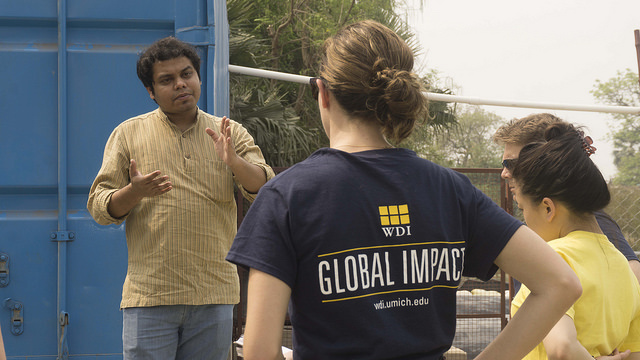
From a 2017 WDI-sponsored MAP team.
WDI’s partnership with Aravind Eye Care System dates back to 1999. Over the years, the organization has utilized a combination of student MBA teams and other engagements with the Institute to explore new ideas for growing strategically and improving operations at its hospitals and clinics, which offer world-class eye care at affordable prices.
Just a few of those completed projects include determining the appropriate governance structures for Aravind, consulting on expanding geographically and growing eye care services, implementing improved operational processes, delivering HR capabilities and leadership training for physicians, and improving the culture and patient experiences. Each of those projects were sponsored by WDI as part of the Ross School of Business’s annual Multidisciplinary Action Projects (MAP).
In 2016, a student team customized and tested an existing process model at select Aravind facilities that measured performance of each unit in terms that everyone in the organization could understand. Last year, the Aravind MAP team worked with senior leadership to develop a roadmap for the eyecare system’s future growth.
MAP is an action-based learning course offered at Ross in which MBA students receive guidance from faculty advisors. Each project requires analytical rigor, critical thinking, and teamwork. (Find out more about WDI’s MAP projects over the years here.)
After learning about their projects and conducting secondary research for several weeks, the students spend two to four weeks working with their organizations in the field.
In March, a MAP team (one of nine sponsored by WDI) will travel to Chennai, India to work at Aravind’s largest facility, which opened in September 2017 and offers the usual suite of services to patients, including specialty eye surgeries. As the new facility nears its six-month anniversary, administrators are studying patient care and looking for areas of improvement.
The students, as part of their overall work to enhance the patient experience, will work with Aravind leadership to develop recommendations on how to transition some of the work performed by eye specialists to general ophthalmologists, who are currently underutilized. Before heading to Chennai on March 17, the team will meet with faculty at the University of Michigan’s Kellogg Eye Center to hear how they manage similar issues.
Members of the MAP team said they are eager to observe the Aravind business model, which student Gerard Heath called “a leader around the world in developing solutions to provide high quality care in low-resource environments.” They all think the experience and work at Aravind will help them in the classroom as they finish up their studies, and may help inform their future career paths.
Kelsey Wyatt-Mair said she is interested in operations and “learning from this hands-on experience will equip me for later in my career, whether it’s in or out of healthcare.”
And Katie Zurales is “excited to see a different healthcare system” and how high quality, cost-effective healthcare “translates to different cultures.”
Of the four team members, which also includes Daniel Semaan, only Wyatt-Mair has some international work experience.
“It will be interesting for all of us – how to navigate that culture,” Wyatt-Mair said. “We’ll get exposed to the similarities and differences of Aravind with, say, Kellogg Eye Center.”
In between the work, the group plans to explore some local temples and beaches and perhaps travel to other cities. They said they were excited to discover Chennai was listed as one of the world’s best “food cities.”
WDI Initiatives often recruit partner organizations to work with MAP teams. The Aravind project is aligned with the Institute’s Healthcare Initiative. Similarly, WDI’s Education Initiative is working with the MAP team assigned to the Technological Institute of the Philippines (TIP) project. The students will create a strategic plan for a newer TIP initiative to improve the engineering and technology skills of students.
Amy Gillett, vice president of WDI’s Education Initiative, said MAP teams are one of the ways the initiative can improve the delivery of management education in emerging markets.
“The MAP teams bring new perspectives to universities in emerging markets,” she said. “They help university leadership think in different ways about how to expand into promising new areas or how to think strategically about growing an existing department or initiative. We’re so pleased to have this opportunity to unite MBA students – with their passion for social impact and their strategic thinking – with our university partners who welcome fresh insights.”
Like many of the Institute’s MAP partners, TIP has collaborated with WDI in the past. TIP was one of three university partners that worked with WDI on the STRIDE project.
“We’re so pleased to continue our successful partnership with TIP,” Gillett said. “During a recent trip to Manila, I had the opportunity to meet with TIP’s leadership. I was really impressed by their commitment to providing access to a college education for underserved communities as well as by their drive to continuously improve their operations and the services they offer to students.”
Here is a summary of each WDI-sponsored MAP project:
Aparajitha Foundations – India
Advisors: Paul Clyde, WDI and Ross School of Business; Stewart Thornhill, Zell Lurie Institute for Entrepreneurial Studies and Ross School of Business
MAP Team: Amirah Patterson, Riki Smolen, Robert Mack, Nathan Stevens
Aparajitha Foundations is a charitable trust that supports the less privileged, mainly in the areas of education and health.
The team will co-create alongside the founding team of the Michigan Academy for the Development of Entrepreneurs (MADE) as they test, validate, and iterate on MADE’s business model and product prototype for supporting entrepreneurs and Small Medium Enterprises (SMEs) in Madurai, India. MADE is a nonprofit institute established at the Ross School of Business by the Zell Lurie Institute for Entrepreneurial Studies, in partnership with WDI and Aparajitha Foundations, that works with entrepreneurship development organizations in developing countries to give individuals operating businesses in these environments the knowledge and best practices they need to thrive.
Aravind Eye Care System – India
Advisors: Paul Clyde, WDI and Ross School of Business; Jim Walsh, Ross School of Business
MAP Team: Gerard Heath, Katie Zurales, Daniel Semaan, Kelsey Wyatt-Mair
Aravind Eye Care System is a vast network of hospitals, clinics, community outreach efforts, factories, and research and training institutes in south India that has treated more than 32 million patients and has performed 4 million surgeries since its 1976 founding.
The MAP team will develop a framework for integrated patient care service delivery.
CURE International – Ethiopia
Advisors: Paul Clyde, WDI and Ross School of Business
MAP Team: Simon Kaufmann, Keegan McQuillan, Alan Wisniewski, Brandon Yelen
CURE operates clubfoot clinics in 17 countries around the world, each tasked with helping children and families deal with the congenital deformity that twists the foot, making it difficult or impossible to walk. In Ethiopia, CURE manages 37 clinics.
The MAP team will work to improve quality and increase scale of leg brace production in Ethiopia.
Ghana Emergency Medicine Collaborative – Ghana
Advisors: David Butz, WDI and Ross School of Business; Jim Walsh, Ross School of Business
MAP Team: Alexander Ukoh, Liam Kraft, Kartik Raju, Shreyance Mandaliya
The Ghana Emergency Medicine Collaborative aims to improve emergency medical care in Ghana through innovative and sustainable training programs for physician, nursing and medical students. The goal of the training programs is to increase the number of qualified emergency health care workers retained over time in areas where they are most needed.
The student team will investigate the feasibility of incorporating mobile payments into the emergency department workflow, including an analysis of how that will impact both the finances and operations of the department.
Imperial Logistics – South Africa
Advisors: David Butz, WDI and Ross School of Business; Ravi Anupindi, Ross School of Business
MAP Team: Justin Loescher, Jasmine Knowles, Courtney Alexander, Javier Castillo
Imperial Logistics provides logistics and supply-chain management across the African continent, and is a leading distributor of medicines and healthcare products.
The MAP team will establish an African Pharmaceutical Wholesaler Association (APWA).
Outbound Initiative – Brazil
Advisors: Paul Clyde, WDI and Ross School of Business; Stewart Thornhill, Zell Lurie Institute for Entrepreneurial Studies and Ross School of Business
MAP Team: Tsering Sherpa, Daniel Vergara Ramirez, Dale Jarosz, Varun Haralalka, Agustin Sosa, Mike Porcelli
Outbound Brasil uses the latest technology to identify global opportunities and resources for the growth of innovative and high impact business in that country, such as new and better markets, customers, partnerships, investments and awards.
The team will conduct a situation analysis on the Brazilian tech investment scenario and make recommendations for which innovations could make smart money more accessible to local startups.
REFRESCH – Gabon
Advisors: Paul Clyde, WDI and Ross School of Business; Bob Dittmar, Ross School of Business
MAP Team: Alena Golovchenko, Felipe Prieto Nunez, Sean Welsh, Allie Murphy
REFRESCH (Researching Fresh Solutions to the Energy/Water/Food Challenge in Resource Constrained Environments), is a consortium of educators and researchers working to improve the lives of those living in resource-constrained communities. Its goal is to find solutions to challenges in the areas of food, water and energy. It is funded by the University of Michigan Third Century Initiative and is headquartered at the University of Michigan Energy Institute.
The student team will identify a set of commercially viable business model archetypes or templates to increase access to renewable energy products and services in Gabon. They also will develop a recommendation on the most likely template to be profitable. A secondary goal is to understand the entrepreneurial skills and capabilities required to launch and operate such enterprises.
Technological Institute of the Philippines (TIP) – Philippines
Advisor: Paul Clyde, WDI and Ross School of Business
MAP Team: Joseph Grandominico, James Schoen, Alexa Thomas, Charlton Washington.
The Technological Institute of the Philippines (T.I.P.) is a leading private tertiary education institution that specializes in engineering and technology courses, and has an enrollment of 25,000 students on campuses in Manila and Quezon City. In 2016, the school launched T.I.P. TechnoCoRe, which aims to develop engineering and technology students’ skills in problem-business opportunity formulation, ideation, validation and execution – the core skills of technopreneurship.
The student team will create a strategic plan for T.I.P. TechnoCoRe.
Vayu Inc – Senegal
Advisor: Paul Clyde, WDI and Ross School of Business
MAP Team: Alexander Franczyk, Brandon Pickett, Adam Ronk, Adam Woodruff.
Vayu has developed an unmanned aerial vehicle (UAV) that can be used to deliver needed medical supplies and products to remote areas. The UAV launches and lands like a helicopter and flies like an airplane once off the ground. It can fly 100 kilometers and hold just over two kilograms of payload.
The team will conduct market analysis and develop an entry strategy for introducing delivery UAVs into Senegal’s market.
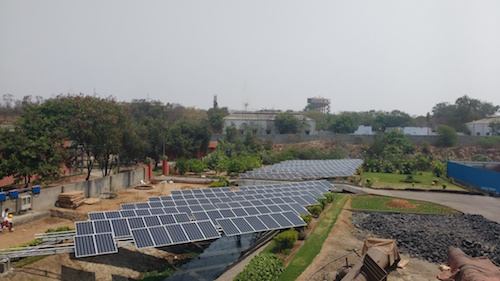
A Freyr Energy solar plant in India, one of the companies included in the research. (Image courtesy of Freyr.)
WDI’s newly created Energy Initiative will examine the effectiveness of several enterprises in India that have been working to bring energy access to marginalized communities in the country for the past three years.
The project, in conjunction with Miller Center at Santa Clara University and New Ventures India, will look at 26 energy enterprises in India to identify what drives performance across different contexts, and develop a framework to inform strategies for energy enterprises that improve commercial viability and increase access to energy. WDI also will study the success of current investments in the energy sector in India, explore new ways to strengthen existing partnerships, and determine if any other gaps exist.
WDI’s Colm Fay will review existing data captured by the Energy Access India program, and conduct additional desk research and remote interviews with some of the participating enterprises and partners. Fay, who is leading WDI’s Energy Initiative, will travel to India in April for follow-up interviews with select enterprises and partners.
The findings from this work will be published in a research report aimed primarily at entrepreneurs who wish to launch and operate inclusive energy enterprises. The report will also provide insights for the ecosystem of clean energy investors and other organizations interested in better connecting energy enterprises with the right kinds of financial and non-financial support – and provide them with actionable recommendations.
“The findings from this research will help both enterprises and investors to better understand the opportunity for commercially viable energy business models in India, and contribute to a more integrated ecosystem of financial and non-financial support,” Fay said.
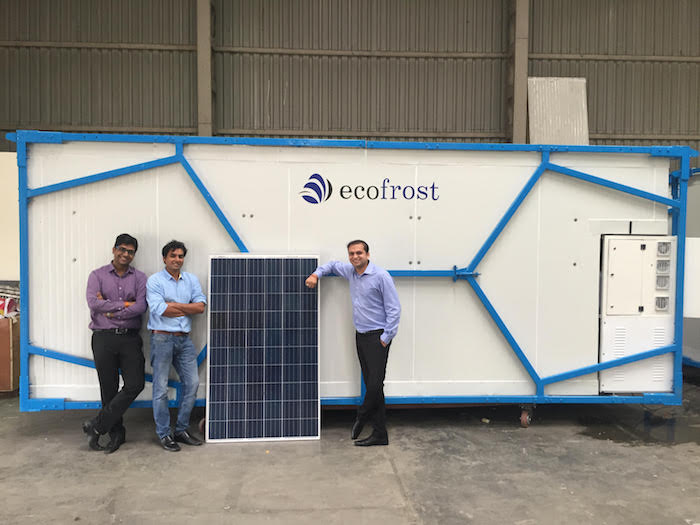
Ecozen Solutions, which has developed a solar powered cold storage system, is another company included in the research project. (Image courtesy of Ecozen Solutions)
The report is scheduled to be released in September to coincide with the end of the Energy Access India program, which began in 2015. The program, funded by the U.S. Agency for International Development (USAID), provided acceleration services to the 26 energy enterprises in the country. The enterprises represent a range of technologies and business models, and have achieved varying levels of success in growth, impact, and financial sustainability.
“Miller Center sees itself as an open source learning laboratory, so sharing what we and our partners have learned through the Energy Access India project is important,” said Andrew Lieberman, senior director of New Programs at Miller Center. “Partnering with WDI for this paper elevates the end result in every way, because WDI brings their deep research capacity, unbiased perspective, and distribution reach.”
Miller Center manages a social enterprise accelerator, the Global Social Benefit Institute (GSBI) with a mission to end global poverty and protect the environment. Since 2003, GSBI has helped to accelerate over 819 social entrepreneurs, who have collectively raised over $580 million. New Ventures promotes clean technology innovation in Asia and Africa to serve the needs of the current and future generations in a sustainable manner.
Boond Engineering & Development provides clean-energy lighting solutions to 100,000 low-income individuals and small-scale enterprises in rural, northern states of India by developing solar-enabled micro grids and other solar energy products.
The student MAP team developed a strategy around data collection and analysis and finding ways to monetize it. Boond collects a lot of consumer demographic data along with energy usage data from its portfolio of micro-grids in rural communities. It aims to analyze this data and explore ways of sharing its findings to those interested based on the strategies developed during this project.
GE Power is a world leader in power generation with deep domain expertise to help customers deliver electricity from a wide spectrum of fuel sources. We are transforming the electricity industry with the digital power plant, the world’s largest and most efficient gas turbine, full balance of plant, upgrade and service solutions as well as our data-leveraging software. Our innovative technologies and digital offerings help make power more affordable, reliable, accessible and sustainable.
The student MAP team developed a go-to-market recommendation for a new set of energy products and services that are focused on providing electricity in emerging markets.
The Samuel Zell & Robert H. Lurie Institute for Entrepreneurial Studies, in partnership with the William Davidson Institute and Aparajitha Foundations, today announced the launch of the Michigan Academy for the Development of Entrepreneurs (MADE), a nonprofit institute that works with entrepreneurship development organizations (EDOs) in developing countries to give individuals operating businesses in these environments the knowledge and best practices they need to thrive. Serial entrepreneur Mike Pape will serve as executive director.
In a developing economy, entrepreneurs and small business owners are key to creating a vibrant, sustainable business climate, but can face unique challenges getting the support they need to succeed. Rather than lean on a theoretical or conceptual framework, MADE collects the practical lessons learned from partner organizations around the world and networks created from years of University of Michigan startup consulting projects in economies such as India, Vietnam, Kosovo and Morocco to help entrepreneurs make important decisions that will add value to their companies. MADE is currently focused on India, but is also building on past work conducted by the William Davidson Institute and Zell Lurie in Vietnam and Kosovo, with plans for further expansion.
“Whether they’re in Silicon Valley or Africa, entrepreneurs bring the energy and vitality that every economy needs to succeed, and the Zell Lurie Institute is committed to supporting them wherever they may be–but what works for a startup in one part of the world doesn’t necessarily work for others,” said Stewart Thornhill, executive director of the Zell Lurie Institute. “At Michigan Ross, we champion the value of learning business through action. Together with Aparajitha and the William Davidson Institute, we want to learn what works for entrepreneurs in different environments based on their experiences, teach what we’ve learned and work with our partner organizations to spread those lessons. We’re looking forward to combining the entrepreneurial know-how of the Zell Lurie Institute with the global business expertise of the William Davidson Institute and the on-the-ground experiences of Aparajitha Foundations to empower local small businesses and economic development around the world.”
“In developing countries like India, ‘learned’ entrepreneurship can go a long way in ensuring the socio-economic development of the country,” said Bharath Krishna, chairman of Aparajitha. “Entrepreneurs not only create value economically but also add to the social fabric of the locality where they have their business. Entrepreneurship that is not just romanticized but done with the understanding of some basic nuances can make a tremendous impact in creating a sustainable ecosystem both locally and nationally. We’re committed to MADE as a true ‘nation-building’ exercise.”
“At the William Davidson Institute, we’re dedicated to helping developing economies find and create sustainable growth solutions,” said Paul Clyde, president of the William Davidson Institute. “A key part of our mission is partnering with businesses, including entrepreneurs, in developing economies to cultivate profitable business models. MADE is a cooperative arrangement that combines the expertise across the University of Michigan with that of successful businesses in these countries. We see MADE as a powerful way to realize our goals as an institute.”
Successful Serial Entrepreneur Mike Pape Named Executive Director
As the executive director of MADE, Pape will provide leadership to a team of MBA students, who are themselves participating in a new program that the Ross School of Business at University of Michigan sees as the next level of action-based learning. The students will not just work on projects but are, in a real sense, running MADE, with Pape providing the continuity from year to year.
Pape has co-founded several life sciences companies, including Esperion Therapeutics, which was acquired by Pfizer for $1.3 billion in 2004; Akebia Therapeutics, which successfully IPOed in 2014; Orchard Venture Partners, a life science venture capital firm; and Nymirum, a drug discovery firm based in North Carolina. Before he became an entrepreneur, Pape was instrumental in the success of numerous cardiovascular drug discovery and development programs, including Lipitor at Upjohn and Parke-Davis/Warner-Lambert (now Pfizer). He holds a bachelor’s degree from the University of Michigan.
“Mike has been a fixture in the Ann Arbor entrepreneurial ecosystem for years—and his track record of founding and scaling successful startups speaks for itself,” said Thornhill. “When it came time to choose the right person to launch and scale MADE—and guide others through the process of getting their own ventures off the ground—there was no question in our minds that Mike was up to the challenge.”
“I know firsthand the challenges entrepreneurs face in getting their ventures off the ground—and I know how valuable their contributions are both as a vehicle for innovation and as a participant in the local economy,” said Pape. “I’m looking forward to working with the full breadth of resources the University of Michigan has to offer—from the MBAs who will be managing all of MADE’s operations and the alumni worldwide who will serve as coaches and local resources to the knowledge resource and institutes housed here. We have the ability to create some really great outcomes, and we’re all looking forward to the challenges ahead.”
For more information, please visit https://madeentrepreneur.org/.
About the Samuel Zell & Robert H. Lurie Institute for Entrepreneurial Studies
The Institute and its Center for Venture Capital and Private Equity Finance bring together an impactful combination of deep-seated knowledge, enriching experiences and strategic opportunities from the front lines of entrepreneurship and alternative investment. Students’ learning experiences are further enhanced through internships, entrepreneurial clubs, business competitions and campus-wide events that foster valuable networking and engage the business community. The School’s five student-led investment funds, with over $8M under management, immerse students in the entrepreneurial business sourcing, assessment and investment process. Founding Zell Lurie advisory board members include Samuel Zell, chairman of Equity Group Investments, and Eugene Applebaum, founder of Arbor Drugs Inc. For more information, visit the Institute’s website at www.zli.bus.umich.edu.
About the William Davidson Institute
Established at the University of Michigan in 1992, the William Davidson Institute (WDI) is an independent, non-profit research and educational organization focused on providing private-sector solutions in emerging markets. Through a unique structure that integrates research, field-based collaborations, education/training, publishing, and University of Michigan student opportunities, WDI creates long-term value for academic institutions, partner organizations, and donor agencies active in emerging markets. WDI also provides a forum for academics, policymakers, business leaders, and development experts to enhance their understanding of these economies. WDI’s mission is to create true, sustainable solutions through understanding, testing, and implementing actionable, private-sector business models that address the challenges and opportunities in emerging markets. To learn more, visit www.wdi.umich.edu.
About Aparajitha Foundations
Aparajitha Foundations, a part of Aparajitha Group, is a charitable trust (Registration No. 463/97) with the objective of supporting the less privileged mainly in terms of education and health. The trust focuses on ‘transformational changes’ to build a stronger community as against transactional changes which may or may not end in long term benefits to society.
Aparajitha Group has been training executives and staff from non-metropolitan areas to make them ‘work’ ready since 2000. Many of them, regardless of their background, have scaled new peaks in their careers with the right kind of inputs and orientation. Aparajitha has drawn on its extensive experience in empowering executives and identified and developed modules for life skills which could be imparted even at an early stage in life. To learn more, visit http://www.aparajitha.org.
Our partnership with the Ruli District Hospital (RDH) and the Ihangane Project (TIP) is to improve healthcare service delivery and operations in Rwanda’s Gakenke District. The Ihangane Project is invested in the improvement of health in the Ruli area, through the provision of material, clinical, and technical assistance to the Ruli District Hospital Health System and Ruli community members. The project scope involved analysis of cash flows within the Ruli Hospital and provide recommendations to improve hospital financial systems. The team focused on cost recovery within various departments in the hospital, and identified four opportunities around:
LiveWell is a specialty rehabilitation center aiming to improve the accessibility of high quality neurological rehabilitation in Hyderabad, India and provide step-down care for patients who have experienced brain trauma such as stroke, brain injury, or brain surgery. A team was engaged to complete a market analysis, including analysis of the current state of the market, barriers to entry, and competition, and recommend a market entry strategy. The team developed a market entry strategy and provided recommendations around patient & physician awareness, pricing models and recruitment of medical staff.